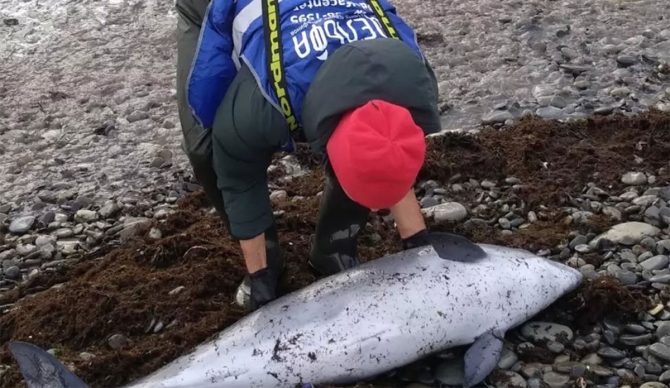
The Black Sea is home to a whole host of cetaceans, and over 30 of them are dead after a spill. Photo: Delpha//Instagram
The Black Sea is home to a number of different cetacean species — including some endangered ones — and it was the site of an oil spill in the middle of December that killed over 30 of them.
According to reports, the spill occurred after a pair of Russian oil tankers were battered by a storm. The oil they were carrying leaked into the Kerch Strait, a thin sliver of water that connects the Sea of Azov to the Black Sea.
“Since the emergency, we have recorded 61 dead cetaceans, including 32 individuals who died after December 15,” Russia’s Delfa Dolphin Rescue and Research Center said on social media, “whose death is most likely related to the fuel oil spill.”
As of this writing, the number 61 is likely to increase. As days go by, more animals are being found
“Judging by the condition of the bodies, most likely the majority of these cetaceans died in the first 10 days after the disaster,” Delfa Dolphin Rescue and Research Center continued. “And now the sea continues to wash them up.”
View this post on Instagram
Although there is murkiness over whether the spill was directly related to all of the dead animals — some were described as “very old bodies” — Delfa workers are convinced that most of them certainly are.
“Almost every day we receive information about new dead dolphins,” Delfa workers said. “For this period of time, such a number of dead is an atypically large figure […] We can expect the number of injured cetaceans to increase in much greater numbers than usual in the coming months.”
Some of the dead animals are Azov dolphins, a rare breed that, while looking like dolphins, are actually a subspecies of the harbor porpoise. Oil spills, as the entire world knows, are devastating to the environment. Not just in the short term, either. Studies of oil spill from years past prove the long-lasting effects on wildlife, which include high death rates, lower birth rates, and a whole host of health issues.
In the coming months, with cleanup taking the front seat, Delfa is preparing for years of remediation.
“[O]ur main task is to prepare as much as possible for this moment and to organize an inpatient hospital to provide long-term assistance to the victims,” it said. “This is critically important, since in areas contaminated with fuel oil, it will no longer be possible to provide assistance to dolphins directly in shallow water, as we did before this season. Therefore, a hospital needs to be organized as soon as possible.”
The Associated Press reported that Russia’s Emergencies Ministry says officials and volunteers have already removed some 96,000 tons of contaminated sand and soil from the Krasnodar region’s Anapa and Temryuk districts.
Russian officials in Moscow-occupied Crimea said that around 200,000 tons of mazut were spilled, which is a “heavy, low-quality oil product.”

